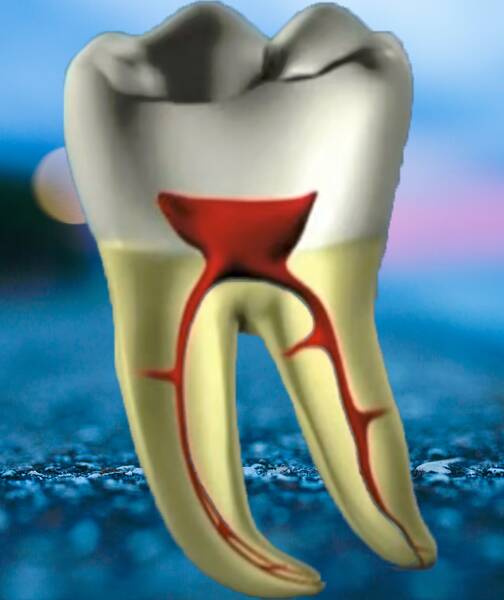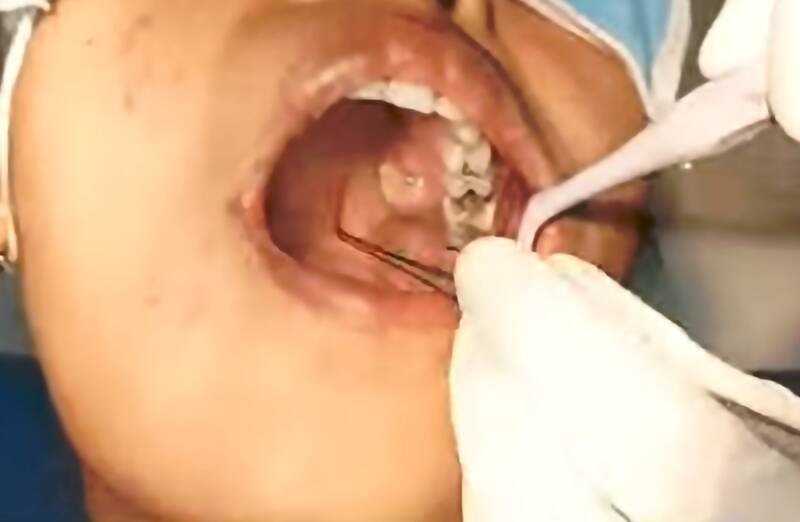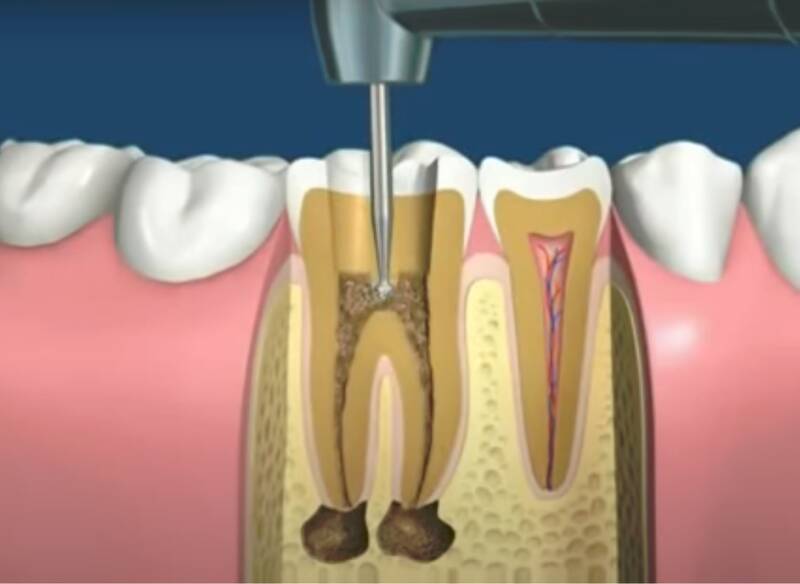Can a root canal treatment cause a headache? How long does a root canal headache usually last? How does a root canal procedure work? And how do I know if my root canal has failed? Do I need antibiotics after a root canal? And finally, what are the symptoms of an infection after a root canal?
I. What is a root canal?
A root canal is a dental treatment commonly known as “nerve killing”. It is a procedure that involves removing the deep part of the tooth when it is injured or infected. The goal of this treatment is to clean the inside of the tooth and fill it with an inert material.
Although tooth decay is the main cause of inflammation and infection of the dental nerves, there are also other reasons to resort to this treatment: trauma, fractures, abrasions, wear and tear. Which are sometimes associated with specific symptoms:
- Dental sensitivity to cold
- Inflammation of the gums
- Discomfort when chewing
- Change of color of the teeth
II. Can a root canal cause a headache?
1. Short answer
Pain and inflammation are the body’s natural response to endodontic techniques. It is sometimes possible for the injuries left by the procedure to manifest as a headache, in addition to pain in the treated tooth.
Usually, this headache and pain only last a few days while the cut nerves heal.
In fact, headaches and dizziness can occur as a result of root canal treatment complications. It usually only takes a few days for this to go away.
And if the problem persists over time, you should go see your dentist who will give you a thorough examination of your entire dentition to detect where the problem is coming from.
2. What is Involved in a Root Canal Procedure?
If the pulp of the tooth becomes severely inflamed or infected, due to injury or decay, for example, the tissue will need to be removed in order to save the tooth and prevent the infection from spreading.
Adults don’t really need pulp; its main use is to help with tooth development during childhood.
Once the area is numbed, a small hole is made in the tooth to access the pulp chamber and canals.
The diseased tissue is removed and the pulp chamber and canals are carefully disinfected down to the root tips.
Teeth in the front of the mouth have a single root and usually only one canal; posterior teeth have two or three roots and usually three or four canals.
These canals and the pulp chamber are filled with an inert biocompatible material and sealed with adhesive cement.
To perform the temporary filling, the endodontist dries the canals, checks their length with X-rays, and places the sealing cement.
Finally, after a few days of doing the temporary filling, it is time to do the final filling.
To do this, the insulation is removed with orthophosphoric acid and the dental adhesive is placed with the dental resin.
During this treatment, the dentist may find it necessary to use antibiotics before or after the endodontic treatment.
Also, it is necessary to monitor the progress of the dental piece to avoid any type of inflammation or infection that could jeopardize the procedure.
If there is a risk that the tooth will be damaged again, your dentist may suggest that you have a crown placed. A crown is a kind of artificial cap that fits over the tooth.
3. How Much Time Does a root canal Headache Usually Last?
The pain after endodontics, and the headache if there is one, usually subsides after several days, between 3 and 8, without the need for any medication.
Generally, the headache or pain is not very severe and can be easily tolerated by a healthy person.
If necessary, anti-inflammatory and analgesic drugs are prescribed to control immediate postoperative pain and inflammation.
If despite taking the medication, the pain persists after 8 days, you should consult your dentist for further examination.

4. What helps with root canal headaches?
Pain in general and headaches, in particular, can sometimes be a consequence of endodontic therapy.
Being a richly vascularized and innervated tissue, the dental pulp exhibits a rapid and marked pain response to various stimuli, which in rare cases can lead to a severe headache.
Some over-the-counter (OTC) medications are very effective in reducing related headaches.
The main ingredient in most OTC pain relievers is aspirin, acetaminophen, ibuprofen, naproxen or a combination of these.
The best way to choose a pain reliever is to determine which of these ingredients is best for you.
5. How do I know if my root canal failed?
Generally, root canals are definitive and effective treatments.
Sometimes there are cases where the root canal procedure has failed. The main reasons for this are:
- Incorrect filling of the root canals
- Leaving a root canal uncapped will leave bacteria present without eliminating them.
- Not taking enough x-rays during the procedure. (This leads to many errors)Misjudging the length of each canal.
- Presence of an undetected crack or vertical fracture of the tooth.
Also here are some symptoms of a failed root canal:
- Intense and continuous pain over time in the treated tooth. Generally, a root canal should not hurt, so if it is a constant and intense discomfort, it may have been performed incorrectly.
- Discomfort when rubbing or palpating the area.
- Inflammation of the gum in the area where the root canal was performed.
- Sensitivity, discomfort, or pain when chewing.
6. How do I know if my root canal is healing?
A root canal is a very reliable dental procedure with a success rate of over 95%. However, even with this high success rate, people wonder how long it takes for a root canal to heal.
Recovery times for root canals tend to be different because every tooth is different.
However, all root canals can be divided into three main categories:
Category one: the tooth is irreversibly inflamed; this gives the patient a burning sensation and pain. These cases do not usually require antibiotics, but painkillers are usually prescribed for a few days until the tooth heals.
It takes one day for the numbness (from the anesthesia) to go away and 3-7 days for it to heal completely after the root canal.
Second category: the tooth is infected and may have severe pain or no pain at all, because the tooth has died from the ongoing infection. This is a more complex case than a simply inflamed tooth, as it may require some infection control for a period of time and then the root canal procedure itself.
Therefore, this case may require a longer recovery time and will also require the use of antibiotics and painkillers after treatment. Total recovery time is one to two weeks after the procedure.
Category Three: This case involves infection and swelling of the tooth. These are therefore the most complicated to treat, as they require close treatment. These cases usually generate deep pain in the patients, as here the infection has usually leaked into the soft tissues and even into the jaw. Therefore, in these cases, the root canal procedure should be started immediately using a medicine called calcium hydroxide on the tooth.
However, most cases can be treated with endodontics alone and with the prescription of antibiotics and painkillers. The total recovery time for these cases is also one to two weeks.
7. Do you need antibiotics after a root canal?
Antibiotics are rarely needed after a root canal. After a root canal, the patient will need to recover quickly and postoperative care is the best method to achieve rapid healing of the root canal.
A dentist may sometimes suggest antibiotics before a root canal to increase the chances of a successful procedure. Only he or she can determine whether antibiotics are needed before or after treatment.
Under no circumstances should medication be taken without the dentist’s approval.
III. Do You Have a Headache That Could Mean You Need a Root Canal?
Root canal treatment is requested when the tissues and nerves of the tooth are so infected that they must be thoroughly cleaned. It is done when the inside of a tooth can no longer be recovered.
It is then that we clean everything to fill the resulting hole with a special material to stop it from becoming infected. And it is known that a good part of headaches come from a dental or gum infection. So we can easily deduce that a root canal infection can in some cases result in a headache. But not necessarily.

IV. Symptoms of an Infection after Root Canal
If you notice the following symptoms, you can quickly and easily detect if you have a bad root canal:
- Tenderness or pain when chewing increases over time.
- Intermittent or constant pain in the affected area that has received treatment.
- Abscess or inflammation of the gum near the treated tooth.
- Pain or tenderness when palpating the tooth.
- Presence of a fistula related to the treated tooth.
- Sensitivity when palpating the treatment area or when lightly tapping the tooth.
- Gum inflammation or abscess around the tooth.
- Previous episodes of gum and/or facial inflammation.
- Pain with temperature changes.
- Presence of an apical lesion on the radiograph that was not previously present, untreated conduits, or with defective treatment.
V. Other Questions About Headache Caused By Root Canal
1. Should I expect a headache after having my teeth cleaned?
A dental prophylaxis is an important treatment with which we thoroughly eliminate bacteria that could not be reached with a home hygiene routine.
It is very rare, if not exceptional, to have a headache after a dental cleaning. However, it is normal to experience tooth sensitivity for a few days after a deep cleaning.
The pain and discomfort may persist for a few days, and your gums may even be swollen and bleeding
2. Is it possible for a dental cyst to produce headaches?
Dental cysts are the result of an infection that has occurred in the tooth or in an adjacent bone. A cavity or a blow to the tooth may be the cause.
Sometimes a toothache can be felt when you have a dental cyst.
3. Can dental X-rays give you a headache?
Taking dental X-rays is essential for a complete diagnosis of the patient.
With these tests, the dentist can have images of the person’s teeth and bones to properly diagnose the problem and then plan treatment.
X-rays have never been reported to have given a headache.
It is also true that some marginal scientific studies have reported a possible correlation between X-rays in general and some forms of brain cancer.
4. Is it possible for a dental bridge to create headaches?
A dental bridge should not cause headaches during the post-operative phase.
However, during the first few days after its installation, it is likely that some discomfort will occur in the operated area.
For this reason, the dentist may prescribe painkillers and anti-inflammatories that will improve and reduce recovery time.
5. Can dental implants give you headaches?
A dental implant is a long-term investment because once placed, it will last a lifetime.
It is true that complications can occur in the days following its placement, in case of rejection.
And during the days following placement, the implants usually cause discomfort and sensitivity, but these disappear completely after a few weeks. Once this period is over, the patient should not worry about eating, biting, or chewing food.
On the other hand, headaches are not a common symptom after dental implant surgery.
6. Should a root canal hurt after 3 days?
The first few days after root canal treatment are usually marked by increased tooth sensitivity.
It is perfectly normal to feel this sensitivity. It disappears as it gradually diminishes.
This condition is characterized by sensitivity to chewing and may persist for one to two weeks after surgery.
7. Can a root canal still hurt after a week?
Yes, it can be as long as two weeks, and sometimes longer. The dentist can prescribe painkillers that will ease the pain.
8. Recurring headaches months after a root canal?
It may be from something other than the root canal. But if it is, then the treatment may not have been done properly and you need to see your dentist for more examination, which will determine the best way to proceed to fix the problem permanently.
9. How long does a root canal last?
A root canal is a fairly common dental procedure, such as a filling, and can be done in about an hour in most cases.
A difficult root canal may take an hour and a half. Front tooth root canals are easier than molar root canals because they have only one nerve instead of 3 or 4.

